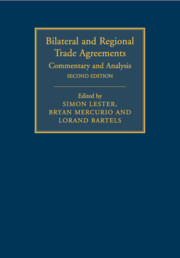Book contents
- Frontmatter
- Contents
- List of contributors
- Foreword
- Table of Cases
- Table of treaties and international agreements
- List of abbreviations
- Part I Introduction
- Part II Economics and politics of PTAs
- Part III Relationship with WTO and international law
- 5 Legal requirements for PTAs under the WTO
- 6 PTAs and public international law
- 7 Regulatory regionalism in the WTO: Are ‘deep integration’ processes compatible with the multilateral trading system?
- Part IV Legal aspects of PTAs: A comparative analysis
- Index
6 - PTAs and public international law
from Part III - Relationship with WTO and international law
Published online by Cambridge University Press: 05 October 2015
- Frontmatter
- Contents
- List of contributors
- Foreword
- Table of Cases
- Table of treaties and international agreements
- List of abbreviations
- Part I Introduction
- Part II Economics and politics of PTAs
- Part III Relationship with WTO and international law
- 5 Legal requirements for PTAs under the WTO
- 6 PTAs and public international law
- 7 Regulatory regionalism in the WTO: Are ‘deep integration’ processes compatible with the multilateral trading system?
- Part IV Legal aspects of PTAs: A comparative analysis
- Index
Summary
I. Introduction
Since the first report of the Appellate Body of the World Trade Organization (WTO) in 1996, commentators and practitioners alike have been grappling with the thorny relationship between the WTO and public international law. More recently, problems in interpreting and applying WTO provisions in the light of customary international law and non-WTO treaties have come to reflect a concern regarding ‘fragmentation’ of international law more generally. One reason for this potential fragmentation lies in the disparate dispute settlement mechanisms under various international legal systems, including preferential trade agreements (PTAs), some of which also contain investment obligations and allow for investor–state dispute settlement.
As the future of the Doha Round remains uncertain, PTAs have proliferated. A large number of states are contemplating or commencing PTA negotiations, including the Trans-Pacific Partnership agreement (a trade and investment treaty involving 12 countries including Australia, the United States, Chile, and Singapore), the Regional Comprehensive Economic Partnership (a PTA developing from the Association of Southeast Asian Nations plus six other countries), and a Transatlantic Trade and Investment Partnership between the United States and the European Union. The burgeoning number of PTAs means that the relationship between them and other institutions and aspects of public international law becomes all the more crucial. States evaluating the benefits of PTAs must be fully aware of the broader international context into which they are born and the implications of international law as each PTA develops. Moreover, existing PTA members may seek additional certainty about their PTA rights and obligations and the likely outcome in the event of a dispute relating to other areas of international law. More broadly, an investigation into the relationship between public international law and PTAs provides an additional case study of the perceived problem of fragmentation of international law.
In this chapter, we focus on two primary sources of public international law, namely treaties and customary international law. We also take into account two other sources of public international law, namely general principles of law and judicial decisions and leading commentary. All four sources are included in Article 38(1) of the Statute of the International Court of Justice (ICJ Statute), which is often recognised as providing an informal list of the sources of international law.
- Type
- Chapter
- Information
- Bilateral and Regional Trade AgreementsCommentary and Analysis, pp. 115 - 141Publisher: Cambridge University PressPrint publication year: 2016



